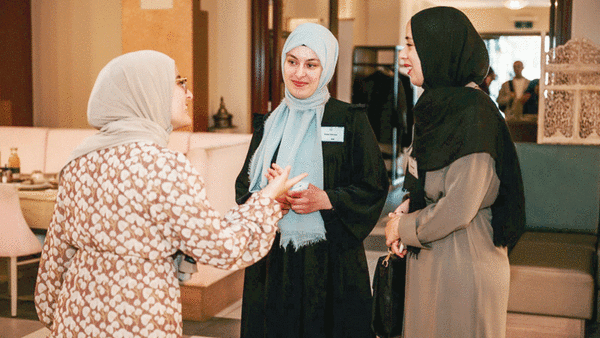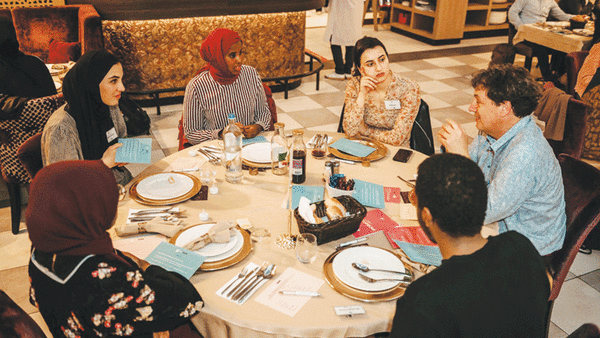

Photo MSA Nederland
The holy month of Ramadhan is an imperceptible chord that binds humans together with the same feeling, which is hunger. Believers sacrifice their hunger and thirst for the sake of the Almighty who ordained to feel the pangs of hunger to understand how much one’s poor neighbour must be suffering and to be grounded just as the ‘palm tree bends further down to earth just as the fruits on them gets ripens day by day’.
Although the believers are separated by the geographical boundaries from each other, the feeling of Ramadhan unites them all and albeit various countries have different variants of iftar and suhour delicacies, the one thing that joins them all is the feeling of hunger and the willingness to sacrifice material pleasures during the day and to be kinder and more merciful to the fellow beings.
Hundreds of thousands of Muslims in the Netherlands started the fasting month of Ramadhan along with the rest of the world on March 22. During this period, Muslims are not allowed to eat, drink, have sex, or smoke from dawn until evening, and they’re encouraged to do more charity work.
Moroccan-Dutch Muslims follow the Islamic calendar based on the moon’s position and the new month begins when the moon’s first crescent appears in the sky. However, Turkish-Dutch Muslims use a slightly different calendar as the Turkish government determines the division of the months a few years in advance, based on computer calculations on the moon’s position over the capital Ankara. Nonetheless, both Turkish-Dutch Muslims started Ramadhan fasting with the other Muslims across the world this year.

In the Netherlands, mosques across the country host joint iftars and Muslims and Islamic organisations distribute food packages during the month catering to the people on the move, in neighbourhoods, and at the mosque. During the month, the Dutch Muslims host numerous activities such as the Ramadhan Conference (a la New Year’s Eve conference), while sports clubs organise sports competitions for young people at later times besides offering meals.
Various student associations also participate in the celebrations. The Amsterdam SUN organisation has been organising an iftar meal in the EYE film museum while Muslim Student Associations (MSA’s) take active part in various iftar-suhour programmes and charity initiatives.
In the Netherlands Muslims observe the holy month of Ramadhan in diverse ways. For most, it is a time for devotion and reflection through fasting, praying and engaging in acts of charity. As community plays a significant role during this month, Muslim Student Associations across the Netherlands are providing a space for young Muslims to come together and celebrate Ramadhan.
“We see in the past years more and more international Muslim students, in search of finding a community, take on an active role within their MSA’s. Most now have international board members, with a handful having international presidents too”, says Rehan Siddiqui, a 24-year old student who is the Vice President of MSA Netherlands (MSA NL), the national umbrella organisation of 16 local Dutch MSA’s.
“Having grown up in the Gulf myself, I definitely missed the Ramadhan environment when I first arrived here and searched for a group to share my iftars and spend the month with,” Siddiqui adds.
As the national umbrella for Muslim students in the Netherlands, MSA NL aims to ensure Muslim students are represented in education and society. This now includes a growing proportion of international Muslim students in addition to Dutch Muslims. This Ramadhan, MSA NL has been organising two iftars, i.e, one with the Dutch Ministry of Interior Department Tackling Racism and Discrimination, and a National Iftar with various figures from the Dutch government.
“We aim to create a better understanding of Islam within Dutch society and institutions, and motivate students through their faith to give back to their society. At the same time, uniting and bringing together our multi-ethnic and diverse group of students, including many from Oman,” Rehan adds.
The understanding of giving back to society and to connect globally through local networks is also facilitated by student-led charity initiatives, such as The Barakah Projects, who each year collectively raise money for a humanitarian aid project in a different country. Last year, The Barakah Projects raised over 15055 euros (RO 6281 approx) for food aid parcels in Afghanistan. This year, students across the Netherlands are organising different activities, such as iftars and lectures, to raise money for the accessibility to education for children in refugee camps in the Banaadir region in Somalia.
“The concept of charity, infaq, from an Islamic perspective is immensely diverse and engaging since the concept of giving is much more than handing over part of your wealth. We aim to inspire and inform many with the importance of this noble act, and the care taking role we have as Muslims for our communities, both local and global. What better time than the month of Ramadhan?,” Raziye Basaran, co-founder and board member of The Barakah Projects asked.
Oman Observer is now on the WhatsApp channel. Click here



